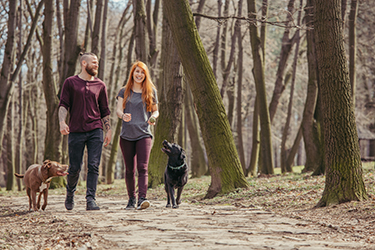Protecting your pets from wildlife

How to protect your pets from predators
Warmer weather brings more wildlife out of hibernation and into the territory of domesticated pets. Coyotes, foxes, raccoons, hawks, snakes and skunks are just a few of the wild animals your pets may encounter in their own backyard. This is true whether you live in a rural, suburban or urban environment.
How can you protect your pets from predators? There are some preventative measures you can take to ensure your pet is safe and healthy and doesn’t need to make an emergency visit to their favorite veterinarian.
Ways to prevent a wildlife encounter
There are many threats and consequences an encounter with wildlife can bring. Not just for people but their pets as well. Follow these guidelines to protect your pets from a dangerous run-in with a wild animal.
Don’t stray from the path
If you’re on a walk with your pet, stay on designated sidewalks or walking trails. If you’re at home, keep your pet indoors or within a fenced or gated area that’s well-lit when night falls. Some wild animals or pets try to crawl under fences. When possible, ensure your fence is buried enough underground so that animals can neither enter nor exit underneath.
Keep food indoors
Keep pet food indoors to avoid attracting unwanted visitors. Keep all trash or compost securely stored in containers and remember that even bird feeders, fruits and vegetables can entice wild animals to roam your property. If you have a picnic or a barbecue outdoors, be sure to clean up any mess and don’t feed any creatures (no matter how cute they are) that may be lurking nearby.
Take cover in the night
Avoid taking pets for a walk on a poorly-lit path or letting them roam freely after the sun goes down. Predators are more likely to be present during the night when humans are not. Keeping pets indoors overnight is the best way to ensure their safety.
Get your pets vaccinated
Prepare for disaster before it strikes. Pet vaccinations are a preventative measure you can take to ensure your pet stays healthy if they come into contact with wildlife. Vaccinations are readily available and highly recommended for things like rabies, Lyme disease and intestinal worms. Not all diseases can be anticipated and treated in advance but when possible it’s better to be safe than sorry.
What should you do if your pet is attacked?
If a wild predator attacks your pet, you need to take action fast. If your pet has been bitten or scratched by a wild animal, they could contract rabies, tapeworm or other diseases. Watch for any signs or symptoms that indicate your pet is affected. Even small bites that appear harmless on the surface can be poisonous or result in infections deep within the tissues. A kick from a wild animal could result in a broken bone or internal bleeding, even if your pet shows no outward signs of blunt force trauma.
Sometimes, your pet is the one who attacks. If your pet eats, bites or even licks a wild animal, they may be at risk. The bottom line is if your pet comes into contact with wildlife, call or make a visit to your veterinarian immediately for evaluation and treatment.
With the new name comes an even more comprehensive set of integrated services and technology solutions for veterinary practices. Contact your sales representative at 855-724-3461 or reach out online to learn more.
Sources:
https://www.petmd.com/slideshows/treating-pets-for-wild-animal-attacks
https://www.petmeds.org/petmeds-spotlight/protecting-pets-from-wild-animals/
https://www.rover.com/blog/how-to-keep-your-dog-safe-from-wild-animals/
https://www.avma.org/public/PetCare/Pages/dogs.aspx
Careers
Are you looking for a place to let your talents shine? At Covetrus, we help our practitioner customers better serve their patients and take pride in providing the best customer experience possible. Search our open positions to see our available opportunities.
Newsletter
Stay current with what’s going on with Covetrus, subscribe to receive our newsletter and email communications. Subscribers will receive the latest information in practice management, sales and marketing, animal health, and more.


Leave a comment